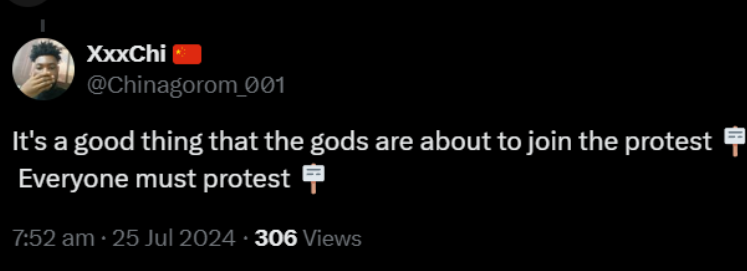Minds of the Movement
An ICNC blog on the people and power of civil resistance
by Amos OluwatoyeJanuary 31, 2025
Last August, Nigerians across the nation took to the streets to protest poor governance. Police and other security forces cracked down on the demonstrations, resulting in some 20 deaths. Even prior to this acute repression, the Nigerian state and state-ordered actors had for weeks attempted to instill a climate of fear and control the public narrative about the campaign. Yet concerned Nigerians and the campaign organizers, who hailed from several movements and civil society groups, were prepared to counter these measures.
Drawing from an interview with Lagos-based campaign organizer Hassan Taiwo Soweto, this article recounts the August 2024 #EndBadGovernanceInNigeria campaign. I examine three less-direct yet still powerful repressive measures—alleged state manipulation of culture and tradition, the hiring of online and offline thugs, and the spread of propaganda. I explore how the campaign countered the narrative that the government was trying to spread. Perhaps more than the planned campaign actions themselves, activists’ methods for countering repression and taking back the public narrative are worth reviewing to distill some key insights about resilience in our struggles.
Tradition and culture: Instilling fear

Referring to Oro, a deity in Yoruba tradition, and the Oro festival, this X user mocks the government’s abuse of culture and tradition as a way to demobilize the campaign.
The Oro Festival is an annual Yoruba tradition. The festival is a patriarchal event, exclusively celebrated by male natives of the hosting communities in the southwest region of Nigeria, including Lagos. During the festival, women and non-natives remain indoors, as tradition dictates that Orò, a deity, must not be seen by those outside the participating group.
Women and non-natives have long played crucial roles in organizing movements and driving protests, making their involvement in the August 2024 #EndBadGovernanceInNigeria campaign invaluable. Thus, the announcement of the Oro Festival, scheduled to coincide with the campaign’s start date on August 1, 2024, was seen as a government move to side-line female protesters.
According to Soweto, many women of all ages came out to join the campaign actions despite the climate of fear. The Oro festival threat itself did not curtail female involvement, due to a number of converging factors. First, concerned Nigerians posted humorous memes on social media to dramatize the government’s alleged abuse of Nigerian culture and tradition to instill a climate of fear. In addition, during the first day of demonstrations, images went viral of a woman carrying an empty pot symbolizing hunger. There were national-level calls by women organizations to join the protests against poor governance, such as this Womanifesto op-ed. Together, this visibility of women helped with outreach to the female population and ultimately offset the efforts of the government to demobilize female protesters.

Soweto during the August 2024 demonstrations.
It's a thug life
Political thugs have always been an instrument of repression against people power in Nigeria. Thugs are loyal to politicians who are desperate to undermine free and fair elections as well as nonviolent action that aims to reinforce democratic institutions. Regarding the August 2024 campaign, Soweto comments:
“Political thugs are threats, both offline and online preventing people from coming out. There was even a video of the thugs, going to a market in Lagos, warning merchants not to join the protest. And at the march itself, you could see them out, wanting to scare protesters away from gathering. And throughout the daily assembly at Ojota, they attacked peaceful protesters. Those who lingered after most of the protesters had left were particularly vulnerable to attacks.”
Anticipating these challenges, organizers underscored the pressing political issues of the campaign—poverty and hunger due to poor governance—to let those issues speak for themselves. Notably, they held a press conference as a way to infuse public narratives with their calls for peaceful collective action to pressure for better governance (more on this just below). This was viewed as a way to boost protester confidence and spread positive emotions.
Infiltration and government propaganda

Members of the press attended the demonstrations. Source: #EndBadGovernanceinNigeria.
The Nigerian Police Force (NPF) and the Department of State Services (DSS) heavily infiltrated the demonstrations, sowing confusion. Soweto reports:
“There were all kinds of non-state actors, clearly mobilized by the state, agents provocateurs to try and introduce disorderliness. The process of dealing with this also meant that the protesters were expending energy on a whole lot of things other than what was most important to the protest. The climate of fear had tangible effects and took the form of accusations of who was or wasn’t a DSS agent. It was really a testy time for those who were trying to provide coordination because you had to deal with all of these issues."
Even prior to trying to introduce violence and disorder, the Nigerian government was also advancing publicly that the campaign was “faceless and leaderless”. The joint press conference that organizers held in Lagos State about a week prior to the demonstrations helped push back against this narrative. During the press conference, organizers hammered their message that protests would be peaceful. Later on, this messaging was helpful to highlight that the violence that ultimately took place was not initiated by protesters but instead by the state and their hired thugs.
In addition, Soweto points out: “I think [the press conference] sort of galvanized and transformed the situation,” as the media coverage of the press conference aided in amplifying the campaign’s credibility. “People were ready to join the protest but were doubtful about what would happen or where to show up,” he adds, “but seeing the press conference on the news helped people understand that this would be a legit gathering.” This underscores the importance of communications and media relations in our nonviolent struggles.
Campaign impacts
While the campaign has yet to achieve any of its demands, it did fulfill the right of the Nigerian people to peacefully assemble, despite the outright and more subtle forms of state repression.
The #EndBadGovernanceInNigeria organizers in Lagos deployed several strategies to navigate these challenges. Leveraging internet/social media, organizers parodied attempts to create fear, which is perhaps one of our most important takeaways about resilience. Requiring proactive coordination, the press conference paid off as it helped counter state-propagated narratives about the campaign. Communications and media relations were thus critical to mobilizing protesters to the campaign, and there is still more work to be done on this. Lastly, visibility of female participation helped build trust with women in Lagos and offset the state's alleged attempts to sideline female protesters.
This case underscores the importance of civil resistance education for organizers, particularly exposure to the full repertoire of nonviolent methods at our disposal. Some methods, like boycotts and various forms of artistic resistance, expose our supporters far less to violent repression than marches and demonstrations, and these should be further explored. The broader our knowledge, the easier it is for us to navigate unforeseen circumstances before, during and after our campaigns.

Amos Oluwatoye
Amos Oluwatoye is a Research Assistant with the Resistance Studies Initiative, the University of Massachusetts Amherst, conducting research on repression under the guidance of Prof. Stellan Vinthagen. He also serves as the Regional Research Lead for Sub-Saharan Africa in the Demo.Reset 2 Project and is pursuing an MSc in Peace and Security Studies at the University of Port Harcourt, Nigeria.
Read More